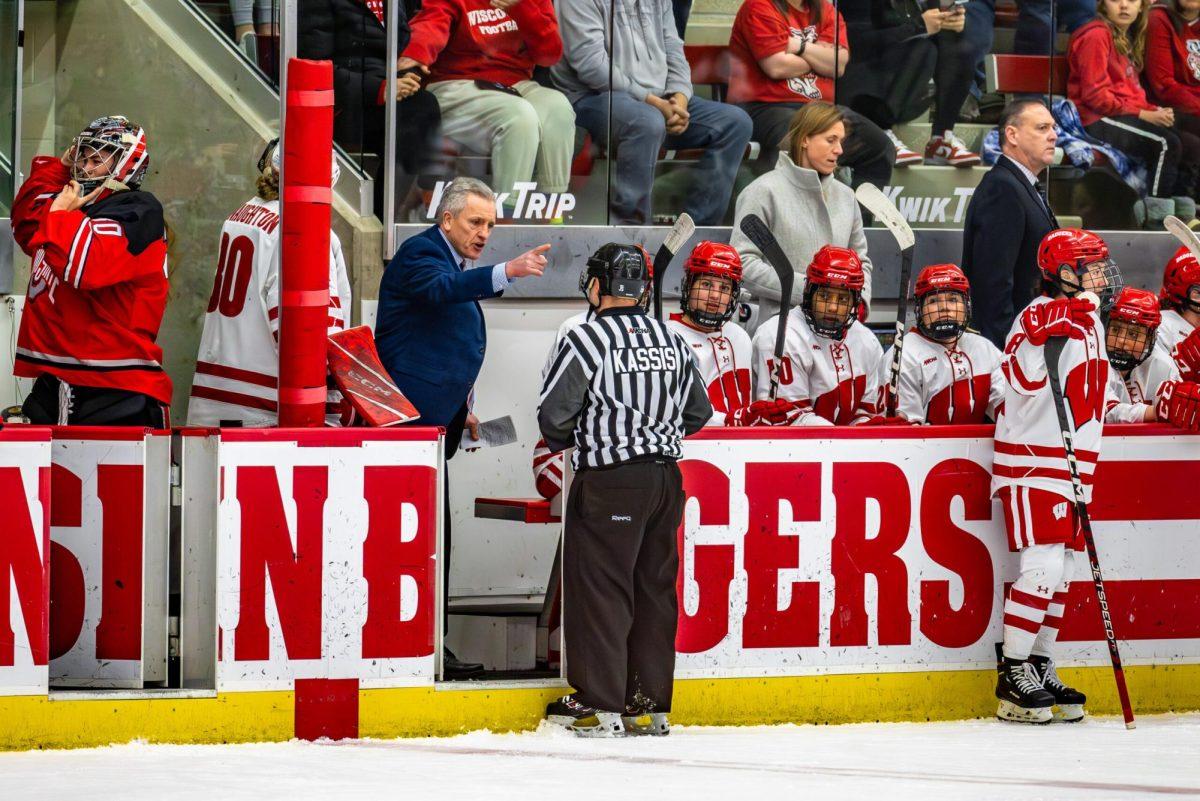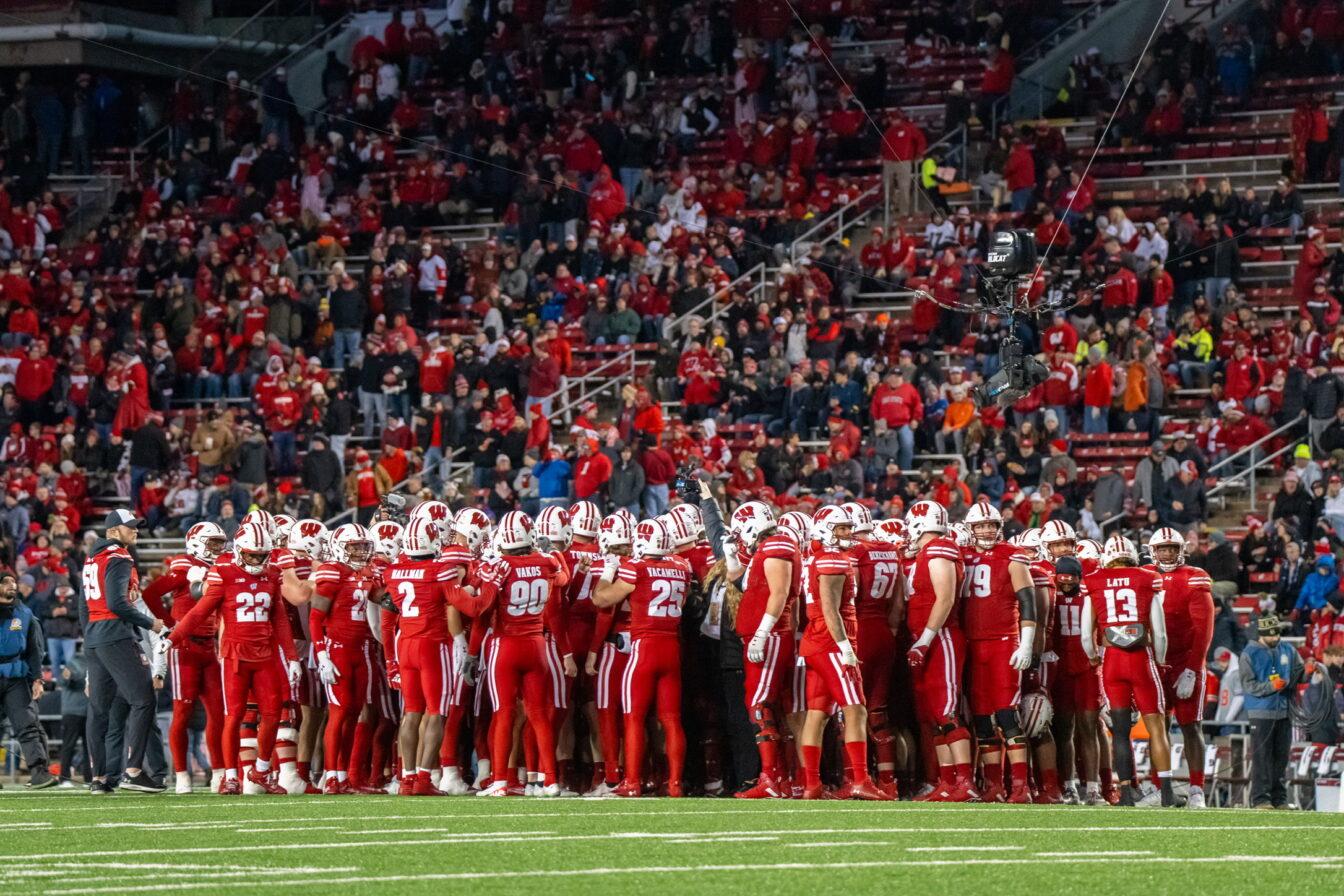[media-credit name=’BRYAN FAUST/Herald photo’ align=’alignright’ width=’336′] [/media-credit]Bud Selig may be a lot of things, but when I heard him speak Tuesday night, the commissioner of Major League Baseball came off as a passionate baseball fan who loves his job.
[/media-credit]Bud Selig may be a lot of things, but when I heard him speak Tuesday night, the commissioner of Major League Baseball came off as a passionate baseball fan who loves his job.
The grumpy, standoffish disciplinarian, who will be forever linked to one of the most embarrassing periods in professional sports, was candid, humorous and approachable Tuesday when he spoke at the Hillel Theater.
Selig, a Jewish University of Wisconsin alumnus, spoke and fielded questions about hot-button topics like the steroid scandal and his new drug testing policy.
Going into the event, I assumed Selig would talk about his experiences as a UW student (which he touched upon), how he became commissioner and avoid issues like steroids and the infamous all-star game tie in 2002. But instead of avoiding or dancing around those issues, Selig took them on with a full head of steam. "I'll beat you to the punch," Selig said when first mentioning steroids, knowing the questions would be coming during the question and answer portion of the program.
"I have no sensibility left, ask me anything you want," he said.
Unfortunately, yours truly was not called upon to ask any of the tough questions I prepared, and Selig declined to be interviewed personally — but many important issues were raised by other students in attendance.
I have never been a fan of Bug Selig and I will never forgive him for his ineptness in handling the steroid scandal — even though he maintains he never knew of any drug problems until 1998 when Andro was discovered in Mark McGwire's locker … um, yeah, sure.
The way he handled the All-Star game in 2002 was atrocious. But Tuesday night I realized that, like many baseball fans, I have been harping on those issues for years while disregarding the triumphs Selig has achieved as commissioner.
Selig has been working in baseball for more than 40 years, with 14 as acting commissioner, and according to him his job is to "give hope and faith to fans that their team can win."
For years, Selig has been taking heat for the lack of a salary cap in baseball, while other professional leagues, such as the NFL and the NBA, have enjoyed great success after implementing some form of cap.
What many baseball fans have overlooked is that the MLB Players Association has made it clear that no form of a salary cap will ever be acceptable. Selig took the issue a step further by implementing revenue sharing to help narrow the economic divide in baseball. Selig has generated $321 million in revenue sharing, and its benefits are being seen every year as small-market teams like the Tigers, Athletics and Twins will all be in the postseason come October.
Although the system needs a little tweaking to ensure teams are spending their shared money correctly and not fielding a team with a $15 million payroll like the Florida Marlins, Selig is on the right track to closing the gap between big and small-market teams.
In 1994 (although it did not come into effect until 1995 because of the players' strike), Selig added a team from each league to the playoffs. The wild card race always proves to be one of the most riveting chases in professional sports, and with recent wild card representatives, the Diamondbacks, Angels, Marlins and Red Sox, winning four of the last five World Series, it's hard to imagine what baseball would be like without it.
While many baseball purists will forever be against interleague play, we can all thank Selig for giving us the chance to watch in-state rivalries be fought on the field, as opposed to having them settled in schoolyards around the country.
Interleague play was finally added to the schedule in 1996, and according to Selig, he had been fighting for it since the '70s. Interleague play has also given way to new rivalries that fans would never have expected to emerge.
Selig added another feather in his cap when he established the World Baseball Classic. Yes, this year's format was a little shaky, and improvements will undoubtedly be necessary in the future, but the WBC was quite successful in its first go-around and the event should grow in popularity in years to come. Cynics will always be opposed to what they call a "made-up event," but when I saw the Dominican team take the field or Roger Clemens take the mound in March, the intensity was similar to a playoff game. Maybe the United States will actually win it someday, but that's neither here nor there.
Selig's innovative All-Star game format, in which the winner is awarded home-field advantage in the World Series, has given new life to a dying exhibition game. Before 2003, I found the MLB All-Star game as excruciating as the Pro Bowl.
This year's game was dramatic and eventful as the American League completed a two-out rally in the ninth inning off all-time saves leader Trevor Hoffman. The game finally has some pizzazz, and the new format forces managers to actually manage the game, as opposed to acting like tee-ball coaches struggling to make sure everyone gets equal playing time.
Selig's accomplishments over the last 14 years will always be overshadowed by the steroid scandal. He will forever be remembered as the commish that could not or would not recognize a problem bigger than Barry Bonds' head. But recently, Selig has done all he can to gain the fans' trust by installing the toughest drug-testing policy in professional sports — even though it took him long enough to get it done. The big boppers have remained clean recently (aside from Rafael "I have never used steroids" Palmeiro), and slowly but surely, the integrity of the game is being restored.
And while this is not an excuse, it's becoming clear that steroids are part of every professional sport. Scandals involving the NFL and the Carolina Panthers are minor stories compared to the steroid saga that plagues Major League Baseball, and it would be naíve to think that the NHL and NBA are completely clean.
Baseball is deemed "America's pastime," and it will forever be held to a higher standard. Before you lynch Selig, remember that the Players Association refused any form of testing until 2002.
Many of you traditionalists out there might hate the WBC, interleague play or the new All-Star format, but apparently you are in the minority, because attendance is up and baseball is more profitable than ever. At season's end, baseball will have broken its attendance record for the third consecutive year as over 73 million fans have gone to the ballpark this season.
Selig's tenure has been controversial, to say the least, and I don't buy into everything he said Tuesday, like when he referred to today's game as "the golden age of baseball," because I think my dad, and yours, might take exception with that. But one thing he said rang very true.
"Baseball is the greatest game there is," and Bud Selig has something to do with that.
Andrew is a junior majoring in journalism. To share your thoughts on Bud Selig, e-mail him at [email protected]














